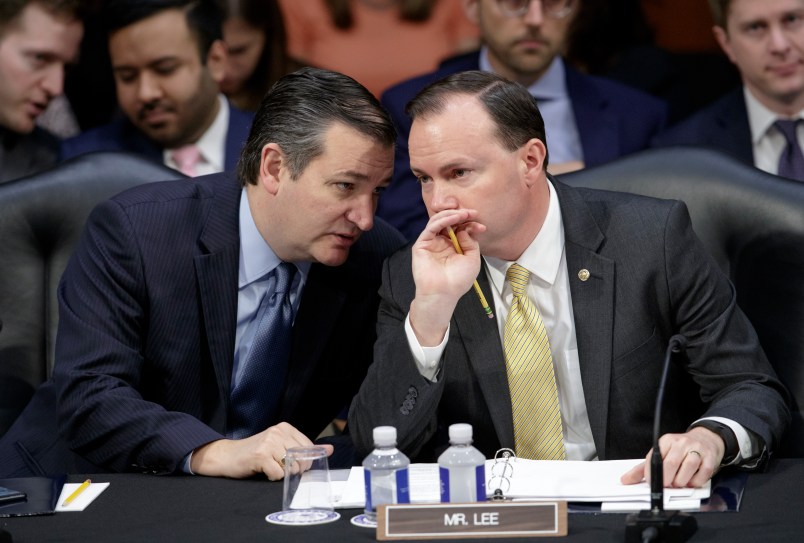Within a few hours of the release of the Senate legislation to dismantle the Affordable Care Act and overhaul Medicaid, four conservatives came out against the bill, putting Majority Leader Mitch McConnell (R-KY) two votes short of what he will need to pass it.
But this is not, by any means, the death knell for the bill, dubbed the Better Care Reconciliation Act, and it might not be even a major obstacle.
A key phrase in the statement from Sens. Ted Cruz (R-TX), Rand Paul (R-KY), Mike Lee (R-UT) and Ron Johnson (R-WI) criticizing bill is that they are not ready to vote for it but “are open to negotiation.” And there’s plenty of reason to believe McConnell left himself some wiggle room, even in the expedited timeline he has set to vote on the bill next week, to win their votes.
Anyone who watched the House dynamics around the passage of their version of a Obamacare repeal bill will remember this old song and dance well. A tantrum by the conservatives there led to the bill being pulled farther to the right. When some House GOP moderates then revolted, some money was thrown at their problems with the bill —namely its rollback of Obamacare protections for pre-existing conditions—and House GOP leadership got enough moderate Republicans back on board to assure its narrow passage.
If anything, McConnell has set up a scenario that is a cleaner and quicker version of this kabuki theatre.
Conservatives aren’t saying yet what exactly they want changed about the bill in exchange from their support, other than that the current bill fails “to repeal Obamacare and lower … healthcare costs.”
“We continue to have positive, productive conversations,” Cruz told reporters Thursday afternoon.
Paul was more vocal in airing his grievances and he might be long gone. But Cruz and Lee were members of the health care working group tasked with negotiating the original discussions, and Johnson was a frequent cameo attendee of their meetings. It stands to reason that McConnell and his staff, who were usually present at working group meetings, have a pretty good idea of exactly what it would take to win them over.
Members of the Senate GOP’s leadership team seemed optimistic there were changes that could be made to get Senate Republicans to 50 votes in support of their bill.
“It didn’t sound to me that [the conservatives’ statement] was all that difficult to work with,” Sen. Roy Blunt (R-MO) told reporters.
Sen. John Cornyn (R-TX), the majority whip, called the current draft legislation a “sort of a best guess about where the Republican conference is.”
“But people have other things the want to see in this bill, and that’s what we’re working through,” he said.
A concession to conservatives would put the ball back in the court of the moderates, who at the very least are uncomfortable with the initial working draft of the legislation. So far, they have stopped short of taking any dramatic stands, but some are cautiously beginning to raise their concerns. If changing the bill to appease the conservatives ends up costing some of the moderate votes, it’s not hard to see where else in the legislation McConnell has created space to throw them some bones.
For instance, the current version of the draft contains only $2 billion in funding for opioid addiction, which Sen. Shelley Moore Capito (R-WV) has already called an “area of concern” given the way slashing Medicaid guts substance abuse programs. One could imagine McConnell eventually upping that number closer to the $45 billion she and Sen. Rob Portman (R-OH) were previously lobbying for. Or he can provide a transition period for the phaseout of Medicaid expansion closer to seven years, what they asked for, instead of the three years allotted in the current bill.
To pay for these sort of extra measures for moderates, there’s room for some tinkering with the tax cuts included in the Senate bill. Some of the taxes that are eliminated by the Senate bill are currently repealed retroactively. The retroactive year can be put back in to raise some extra revenue.
How long it will take for this public bargaining to unfold is another question. Senate GOP leaders are hopeful for a vote by next Friday before Congress leaves for its July 4 recess.
Cornyn suggested that McConnell could file a final bill Tuesday that looks a little different than the “discussion draft” unveiled Thursday morning. That would require additional analysis by the CBO, on top of the score of the current bill expected early next week. “We’ll be talking to them about individual tweaks and changes if there are any,” Cornyn said.







The GOP will cave bigger than Mammoth Cave…
One question about the article: what makes people think that whatever “concessions” are required to get 50 votes will be subject to CBO scoring before a vote? The draft as unveiled is already almost certainly different from what went to the CBO.
They’ll just give those senators “more information” (say, about the amount that will be transferred to their PACs or about their new committee assignments) and everything will be copacetic.
“Conservatism” in the United States means tax cuts for the rich and large corporations. And virtually nothing else. So “conservatives” in the Senate will in the end knuckle under and vote for the bill. If it is to be defeated, it will have to be by “moderates.”
In the end, the only unifying position of the GOP is cutting taxes for the rich and cutting benefits to the poor. The Trump GOP Senate hardcore far right wingers will all vote for this awful bill, since it is their agenda.
Are there 3 GOP “moderates” who would vote against this monstrosity of a bill?